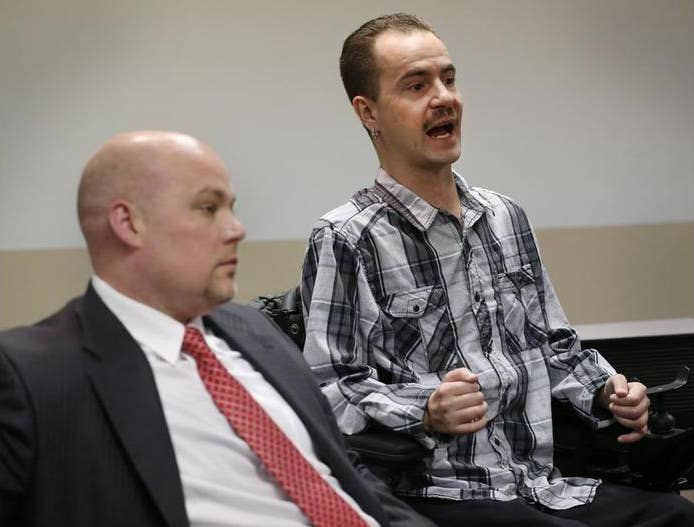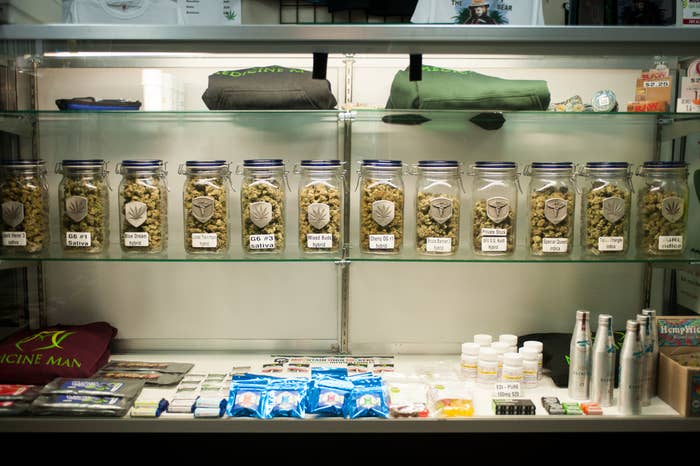
DENVER — Brandon Coats was working as a customer service representative for Dish Network when he was given a random drug test in spring 2010. Although he had worked there for three years, the company fired him when the 30-year-old quadriplegic tested positive for marijuana.
Coats — who has used a wheelchair since age 16 after a car he was riding in crashed into a tree — says he uses marijuana to control his muscle spasms, which weren't alleviated by other pharmaceuticals.
"It's a matter of need, and not a matter of want," Coats' attorney Michael Evans told BuzzFeed of his client's marijuana use.
Coats sued Dish Network, arguing that his medicinal marijuana use was legal and that he was never impaired while working, but the trial judge quickly dismissed the case.
Last April, the Colorado Court of Appeals upheld Coats' firing in a divided opinion.
The court decided Colorado's Lawful Off-Duty Activities Statute, which prohibits employers from firing employees for participating in legal activities during their free time, like gambling or drinking alcohol, doesn't apply to marijuana. For the judges, the fact that marijuana is still a federal crime means it is unlawful across the board and the protections of the law don't apply.
Colorado's Supreme Court announced on Monday that it will review Coats' case. The court will likely hear oral arguments this summer, with a decision in late summer or fall, attorney Vance Knapp told the Denver Post.
Evans said even if Coats wins his case at the state Supreme Court, he wouldn't be surprised if Dish tries to appeal to the United States Supreme Court.
"If he can't win this case, nobody can," Evans said.

The case has created a catch-22 for employees and their supervisors, bringing into question the hazy details of individual's rights within Colorado, a state where marijuana has been legalized recreationally since Jan. 1.
Although Amendment 64 legalized weed, it simultaneously assured employers they still have the rights to drug tests and to fire employees if they test positive, even if the drug hasn't been in their system for weeks. According to the law, nothing in the amendment will "affect the ability of employers to have policies restricting the use of marijuana by employees."
"Right now everything is in favor of employers," said Curtis Graves, a staff attorney for the Mountain States Employers Council, a nonprofit that represents around 3,000 companies.
Graves, who helps advise companies on their drug policies, said many employers have come to him "freaking out" since the law went into effect.
"The whole thing is nonsensical, because it's legal, but it's not legal," he said. "There's still a certain level of hysteria out there."
Throughout the country, employers in eight states have been banned from firing workers for participating in "lawful products" outside the workplace as of 2010; 17 other states, plus D.C., prevent companies from letting employees go for smoking tobacco.
But the wording of Colorado's law begs the question: How legal is legal weed if it carries an implicit warning that people smoking it could potentially lose their job, their apartment, or custody of their child?
"Everyone's attention is focused on the shiny new post-prohibition legal marijuana industry, and how regulated, interesting, and cool it is," said Harry Levine, a sociology professor at Queens College who runs marijuana-arrests.com. "But over here behind door number one is the still-existing structures of nationwide drug prohibition."

Decades of prohibition have established a routine for employers of looking to drug tests and background checks for signs of weed use; some are wary of the consequences that might result from acting too fast to alter their policies following the change in law, especially for national companies attempting to juggle the continued stigma of marijuana use. But only evidence of current cannabis impairment, not past use, should be grounds for firing an employee, the American Civil Liberties Union argues.
Since Amendment 64, the attorney Graves said some employers have tightened their policies, largely those in safety-sensitive industries that could be held liable for mistakes made by employees who were under the influence.
"Anyone who works in health care will be hindered if they test positive for a substance that is outlawed," the director of public affairs, Cheston Turbyfill, for SCL Health System — one of the largest employers in Colorado — told BuzzFeed, referring to federal law.
Though only certain departments at the University of Colorado use drug tests, a positive result would likely prevent the person from being hired, said spokesman
Ken McConnellogue. Technology developer Lockheed Martin, the second-largest employer in Colorado, also requires its employees to undergo a drug test.
"Drug testing and verification of a negative drug test is mandatory for all U.S.-based new hires and rehires before employment," Gordon Johndroe, Lockheed Martin's vice president of media relations, told BuzzFeed in a statement.
But other industries, like those in resort communities, have loosened their ties because, as Graves puts it, "if they refused to hire everybody who had smoked a joint in the last month they would soon find themselves with no workforce." (Various resorts contacted by BuzzFeed declined to comment.)
One shortcoming of the most common drug testing technique is that marijuana will show up on a urine test for weeks, making the test an unreliable tool for judging whether the person was impaired during work or leisure time.
"I like to say, if you could develop a test that could tell if somebody had a beer two weeks ago, would you use that test to find out that they drank a beer and then fire them if it came back positive? Unthinkable, right? It doesn't even make any sense," Graves said. "But basically that's what we're doing with marijuana."
While oral tests only test ingestion over the last couple of days, most drug companies continue to use the urine test because it's the longtime protocol of the federal government. Graves added that the government has been evaluating oral fluids testing for a few years, but does not yet use it.
"You can consume on the weekend and still test positive on Monday," Taylor West, deputy director for the National Cannabis Industry Organization, told BuzzFeed, sitting in her third-floor office in a spacious house in Capitol Hill. "That leaves a lot of room for unfairness."
And while the concept of a drug test that doesn't include marijuana has reportedly been thrown around by ChemScreen, a drug testing company based in Boulder, Colo., it is not yet available publicly. The company ignored multiple requests for comment.

The requirement of background checks, too, has become questionable since the legalization: whether employers have a right to be concerned about a past conviction involving marijuana if it occurred while it was still a crime, despite the fact it's now freely available.
As marijuana reached new levels of legalization in Colorado over the past few years, some companies have begun to implement background checks of their current employees, Maureen Cain, policy director for the Colorado Criminal Defense Bar, told BuzzFeed.
"They were firing people who had worked there for years, because now they found out they had a felony conviction," she said, "even though they had worked there a long time and were good employees."
A small woman with a copper-colored bob, Cain explained what the options are for people whose records are marked with a past conviction.
Since 2008, people have been able to get the records of their past drug convictions sealed, and starting in 2013 only have to wait a year for petty offenses. But she is hoping to encourage the legislature to take up a new bill that would automatically seal some records to end some of the employer discrimination — an idea, she pointed out, that has been supported by Attorney General Eric Holder.
Though an unclean background check isn't a deal breaker for everyone — people can still become lawyers registered in Colorado even if they've committed a felony, for example — the potential for a past indiscretion to haunt someone is still cause to dampen the fresh euphoria of legalization, and make users — both medicinal and recreational — hesitant to participate. With an already meager job market, an imperfect background could keep a person struggling to find employment.
"We are disenfranchising so many people by using their criminal histories to limit their jobs," Cain said.
It could be a long time until Colorado residents see a change in their employment policies — that is, unless Brandon Coats and Michael Evans win their case against Dish Network, which said in a statement that the company does not comment on specific employee matters.
Generally, though, spokesman John Hall told BuzzFeed, "As a national company, Dish is committed to its drug-free workplace policy and compliance with federal law, which does not permit the use of marijuana, even for medicinal purposes."
For now, Evans and Coats are preparing for their potentially groundbreaking case to move forward, with many throughout the state — and the entire country — watching for the outcome.
"He's doing it for him and he's doing it for everybody else that might be like him," Evans said, "and to that extent making history."
